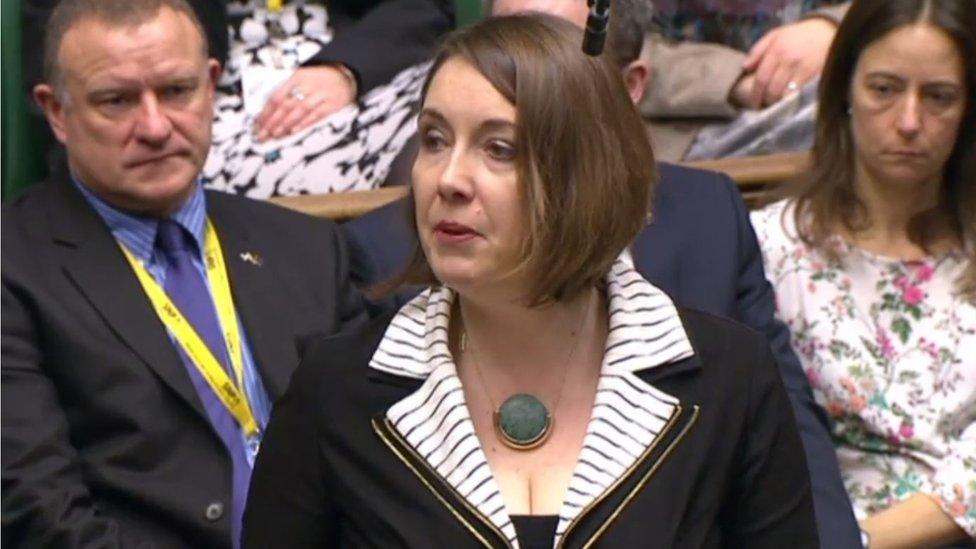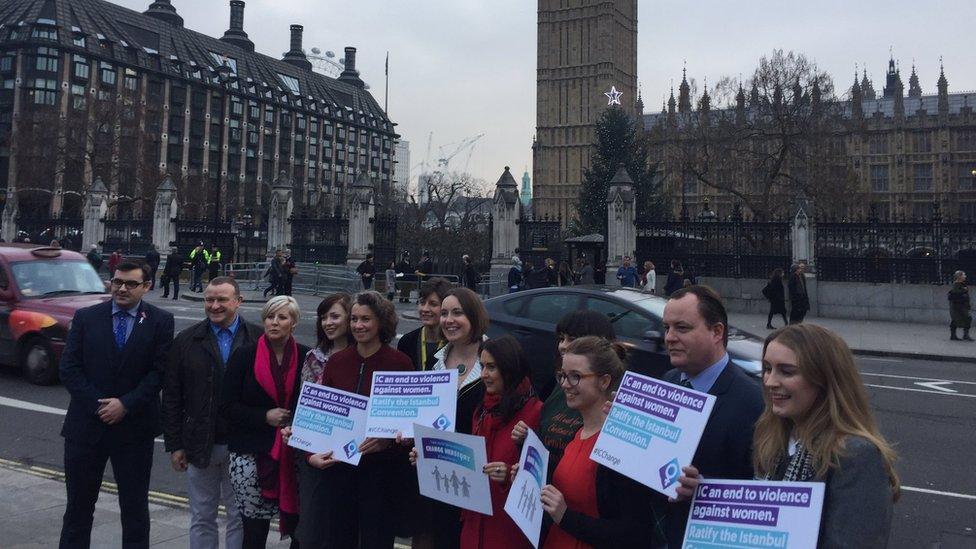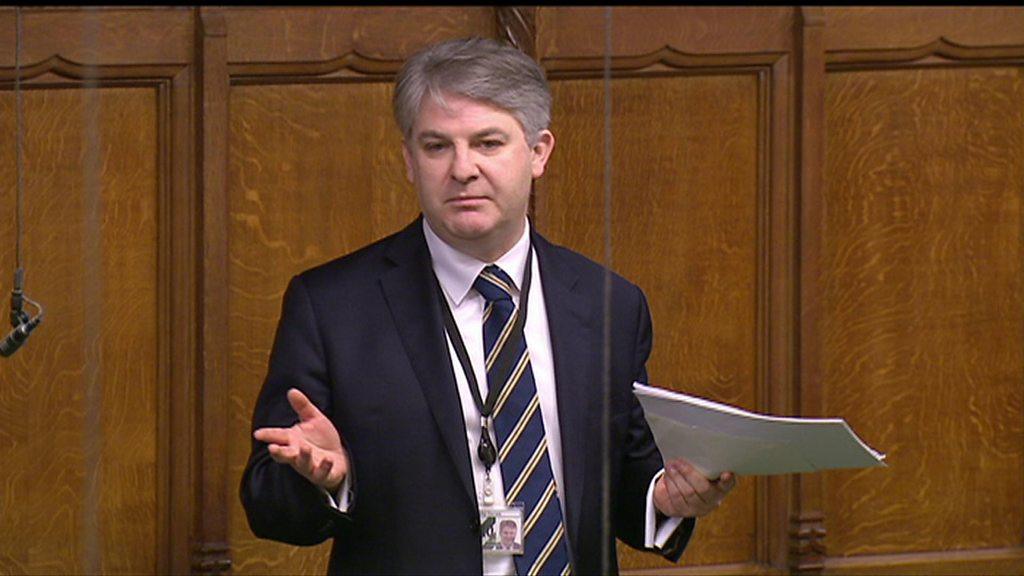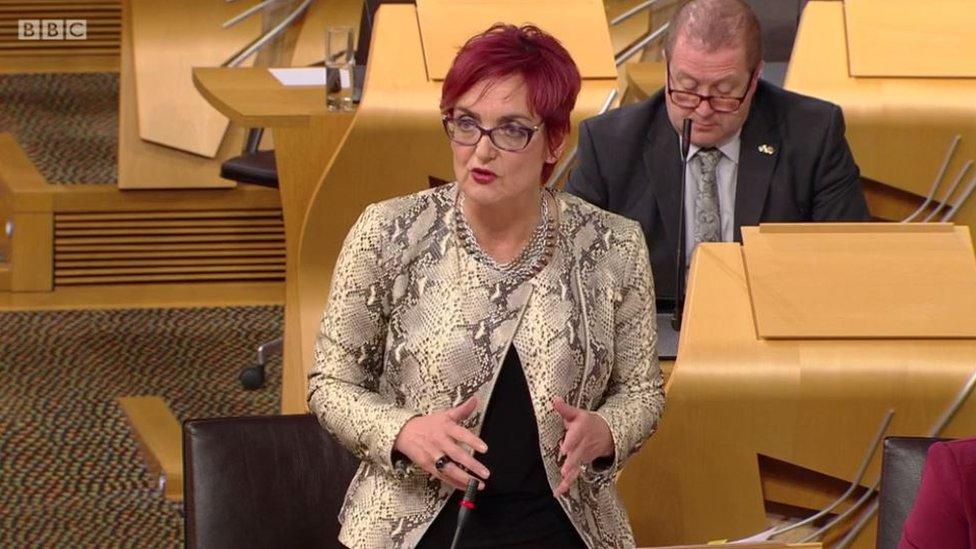Government backs SNP MP's violence against women bill
- Published

Eilidh Whiteford said the vote had "sent out a strong signal to women across the UK"
The UK government has supported an SNP MP's bill to ratify an international convention on violence against women.
The government signed up to the Istanbul Convention in June 2012 but is yet to formally ratify it.
Banff and Buchan MP Eilidh Whiteford put forward a member's bill on the subject, calling for a "united voice".
One Tory MP was accused of trying to "filibuster" the bill by talking for 78 minutes, but it progressed to the next stage by 135 votes to two.
Ministers said they are "committed" to the convention, which states that "it is the obligation of the state to fully address" violence against women "in all its forms", and to take measures to prevent it, protect its victims and prosecute perpetrators..
However Home Office minister Brandon Lewis also said he would want to amend the bill at a later stage to remove a four-week timetable included, leading to calls for "hard, specific dates" on when action would be taken.
'Bottom drawer'
The Scottish government had also urged the UK to ratify the Council of Europe accord, external.
During a debate of her bill, Ms Whiteford said the government needed to "take the Istanbul convention out of the bottom drawer" where it has been filed as something "too complicated, too difficult, too low a priority".
She said MPs from all sides of the house had signalled their support for the bill, adding: "I'm hopeful a united voice from parliament today can bring ratification significantly closer."
Conservative MP Philip Davies objects to domestic violence bill
Home Office minister Mr Lewis replied that the government was "committed" to ratifying the convention.
He said the government was working to tackle crimes which disproportionately affect women and girls, and said existing laws protected them in almost all cases.
He confirmed the government would back the bill, but with some alterations at committee stage - such as removing a four-week timetable built in to it.
The government say domestic law needs to be changed prior to ratification, due to some "extraterritoriality" issues with parts of the convention cutting across local legal jurisdictions. Devolved administrations will also have to be consulted.
Edinburgh MP Michelle Thomson, who recently described to MPs how she was raped as a teenager, welcomed the "warm words" from Mr Lewis, but said "we're looking for hard, specific dates about when something will be done".
'Strong signal'
SNP MP Roger Mullin revealed that his wife disclosed that she was abused as a child after seeing Ms Thomson's speech.
He said his partner had spoken out about the incident for the first time this week.
Earlier in the debate, Conservative MP Philip Davies sparked anger among members by giving a 78-minute speech, in an apparent attempt to filibuster the bill by using up all the allotted time for debate.
He said the bill "introduces unnecessary meddling from supranational bodies that we can quite do without", adding that "political correctness has become so entrenched in this country".
The Lib Dems questioned "why on earth you would spend your Friday trying to block this", saying Mr Davies constituents were "getting very poor value".
Only two MPs ultimately voted against the bill, which now moves to the next stage in the parliamentary process.

Ms Whiteford and other MPs gathered outside Westminster to celebrate the result
Ms Whiteford said parliament had "sent out a strong signal to women across the UK".
She said: "The Istanbul Convention lays the groundwork for us to do more to prevent and combat violence against women and domestic violence here in the UK and overseas. It is the best piece of violence against women legislation that has ever been written, anywhere.
"Obviously today's vote is only the start of the parliamentary process, and I'm looking forward to working with MPs across the House for the subsequent stages."
Scottish Equalities Secretary Angela Constance, who earlier wrote to Home Secretary Amber Rudd about the convention, said she was "delighted" to see cross-party support for the bill at Westminster.
She said: "Today's vote is a significant step towards increasing protection for those most in need and ending violence against women and girls once and for all.
"I hope the UK government will listen to the views that have been expressed from MPs of all parties today and set out a clear timetable to ratify this important Convention as soon as possible."
- Published16 December 2016

- Published1 December 2016
